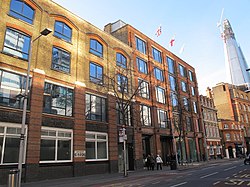
Southwark is a district of Central London situated on the south bank of the River Thames, forming the north-western part of the wider modern London Borough of Southwark. The district, which is the oldest part of South London, developed due to its position at the southern end of the early versions of London Bridge, for centuries the only dry crossing on the river. Around 43 AD, engineers of the Roman Empire found the geographic features of the south bank here suitable for the placement and construction of the first bridge.

Bermondsey is a district in southeast London, part of the London Borough of Southwark, England, 2.5 miles (4.0 km) southeast of Charing Cross. To the west of Bermondsey lies Southwark, to the east Rotherhithe and Deptford, to the south Walworth and Peckham, and to the north is Wapping across the River Thames. It lies within the historic county boundaries of Surrey. During the Industrial Revolution Bermondsey became a centre for manufacturing, particularly in relation to tanning. More recently it has experienced regeneration including warehouse conversions to flats and the provision of new transport links.

The London Borough of Southwark in South London forms part of Inner London and is connected by bridges across the River Thames to the City of London and London Borough of Tower Hamlets. It was created in 1965 when three smaller council areas amalgamated under the London Government Act 1963. All districts of the area are within the London postal district. It is governed by Southwark London Borough Council.
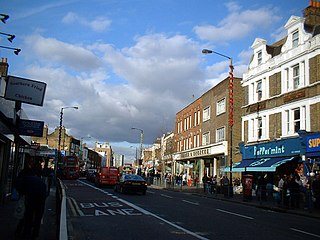
Walworth is a district of south London, England, within the London Borough of Southwark. It adjoins Camberwell to the south and Elephant and Castle to the north, and is 1.9 miles (3.1 km) south-east of Charing Cross.

Elephant and Castle is an area of South London, England, in the London Borough of Southwark. The name also informally refers to much of Walworth and Newington, due to the proximity of the London Underground station of the same name. The name is derived from a local coaching inn.
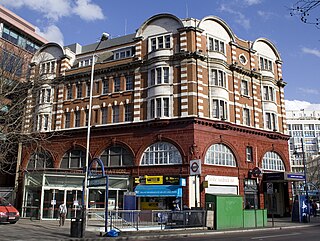
Elephant & Castle is a London Underground station in the London Borough of Southwark in south London. It is on the Bank branch of the Northern line between Borough and Kennington stations. It is also the southern terminus of the Bakerloo line and the next station towards north is Lambeth North. The station is in both Travelcard Zones 1 and 2. The Northern line station was opened in 1890 by the City and South London Railway (C&SLR) while the Bakerloo line station was opened sixteen years later by the Baker Street and Waterloo Railway (BS&WR). There is an out-of-station interchange with the nearby Elephant & Castle National Rail station.

Herne Hill is a district in south London, approximately four miles from Charing Cross and bordered by Brixton, Camberwell, Dulwich, and Tulse Hill. It sits to the north and east of Brockwell Park and straddles the boundary between the boroughs of Lambeth and Southwark. There is a road of the same name in the area, as well as a railway station.

Borough High Street is a road in Southwark, London, running south-west from London Bridge, forming part of the A3 route which runs from London to Portsmouth, on the south coast of England.
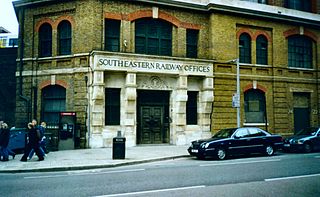
Tooley Street is a road in central and south London connecting London Bridge to St Saviour's Dock; it runs past Tower Bridge on the Southwark/Bermondsey side of the River Thames, and forms part of the A200 road.

Hay's Galleria is a mixed use building in the London Borough of Southwark situated on the south bank of the River Thames featuring offices, restaurants, shops, and flats. Originally a warehouse and associated wharf for the port of London, it was redeveloped in the 1980s. It is a Grade II listed structure.

The Bakerloo line extension is a proposed extension of the London Underground Bakerloo line in South London from its current terminus at Elephant & Castle to Lewisham station.
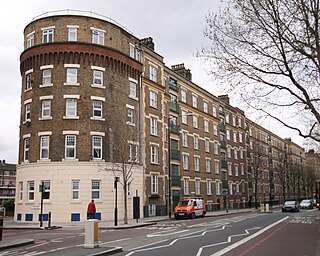
Devon Mansions are a set of five residential mansion block buildings situated along the south side of Tooley Street in Bermondsey, London. The buildings are located within the London Borough of Southwark and are included in both the Tower Bridge and Tooley Street Conservation Areas.

Bermondsey Square is on Tower Bridge Road in Bermondsey, south London, England. It was the site of the 11th-century Bermondsey Abbey. The earliest medieval remains found are a Norman church from around 1080, which was recorded in the Domesday Book of 1086. The Abbey grounds were the original site of Bermondsey Market, which still takes place weekly in the Square. The area has subsequently undergone redevelopment and Bermondsey Square now contains apartments, offices, a boutique hotel, restaurants, and a contemporary art gallery.

Southwark London Borough Council, also known as Southwark Council, is the local authority for the London Borough of Southwark in Greater London, England. It is a London borough council, one of 32 in London. The council has been under Labour majority control since 2010. The council is based at 160 Tooley Street.

St Saviour's War Memorial is a war memorial on Borough High Street, in the former parish of Southwark St Saviour, to south of the River Thames in London. It became a Grade II listed building in 1998 and was upgraded to Grade II* in 2018.
RIBA National Awards are part of an awards program operated by the Royal Institute of British Architects, also encompassing the Stirling Prize, the European Award and the International Award. The National Awards are given to buildings in the UK which are "recognised as significant contributions to architecture" which are chosen from the buildings to receive an RIBA Regional award.
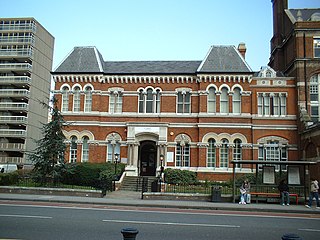
Walworth Town Hall is a municipal building in Walworth Road, Southwark, London. It is a Grade II listed building. It was built for the vestry of the parish of Newington, opening as the Newington Vestry Hall in 1865. When Newington became part of the Metropolitan Borough of Southwark in 1900 the building served as Southwark Town Hall. It ceased to be a headquarters of local government in 1965 when the London Borough of Southwark was created.

Camberwell Town Hall is a municipal building in Peckham Road, Camberwell, London, England.
Southwark Town Hall may refer to:

Tabard Gardens is a small park in Southwark, London. It is located on Tabard Street and gives its name to the surrounding Tabard Gardens Estate. The park was created as part of a slum clearance programme by the London County Council and opened in 1929. It is owned and managed by Southwark Council.
